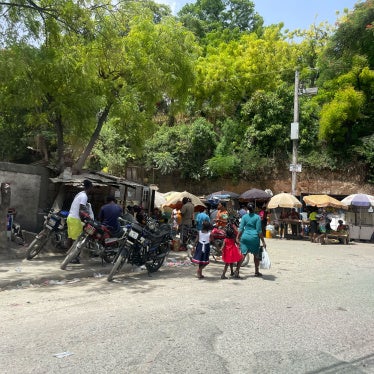As told by Marianne Mollmann, advocacy director for the women's rights division
I sat at the table and smiled at the room full of Argentina's parliamentary representatives. I made sure my papers were in order. I was the opening speaker for Argentina's first parliamentary debate on legalizing abortion.
The room was packed. Rows of people sat behind cramped tables, and people standing in the back jockeyed for position. Journalists had been herded to the far side of the room. Nearly everyone wore suits, except for the pro-choice activists, who wore their signature bright green bandanas.
The lights in the front half of the room weren't working, and someone joked about abortion being a darkened debate in Argentina. I reflected on my arrival, and how my driver reacted when I told him that I worked on abortion access. "I'm assuming that no [woman] is born with that kind of killer instinct," he said. I knew this debate would be a challenge.
In Argentina both abortion and access to contraception are hotly contested. Abortion is only legal in instances of rape or when a woman's life is in danger, and even then doctors sometimes refuse to perform the procedure. Compounding the problem of unwanted pregnancy is the fact that birth control, legalized in 1985, can be hard to come by. Although Argentine law requires the public health system to provide free contraceptives, the government's failure to purchase and distribute birth control reliably means it often isn't available. This puts women's health - and sometimes their lives - at risk.
The chairman of the criminal law committee introduced me. He explained that he wasn't for legalizing abortion, but had been so moved by Human Rights Watch's two reports on reproductive rights in Argentina that he had vowed to start a public debate.
I leaned forward, looked around the room, and started speaking. I talked about women who were refused medical help at hospitals after back-alley abortions went wrong. I reminded them that Argentina's Health Ministry had announced the day before that, yet again, illegal abortions were the leading cause of maternal death in Argentina.
I ended my speech with a statistic. "Forty percent of pregnancies in this country end in abortion," I said. "Logically, this means every person in this room knows at least one person who had at least one abortion. I am certain that these women and girls - your sisters, daughters, mothers, and friends - did not make this decision lightly." The room went silent.
The floor was opened to parliament members for questions.
"Why is making abortion illegal discriminatory against women without resources?" asked one. "What happens in countries where abortions are legal?" asked another. "Does it open the flood gates?"
I explained that poor women who rely on public health services were more likely to have trouble accessing contraception, making them more likely to have an unwanted pregnancy and fall victim to a botched back-alley abortion. Legalizing abortion doesn't mean there will be fewer unwanted pregnancies, but it does mean that the needed abortions will be safe. In 2008, unsafe abortions caused more than 20 percent of deaths in Argentina from obstetric emergencies.
I added that you can lower the abortion rate by giving people access to contraception and education.
Then one female representative asked, "What about the right to life for the fetus?"
It was a good question. And I gave her the best answer I could - that under international law, there is no right to life for the fetus. I acknowledged that this argument wouldn't sway her, but that I hoped we would agree on one thing: There should be fewer abortions in Argentina, and that we should push for policies that will get us closer to not needing abortion.
Argentina already has many laws designed to protect women. Our first report on reproductive rights in Argentina, released five years ago, called for the legalization of voluntary sterilization and obligatory sex education. In part because of our report, these changes were made. But our 2010 report showed that in practice, Argentina's women have the same problems realizing their reproductive rights now as they did then. Laws protecting women are on the books, but they aren't enforced. Doctors need to be held accountable if they deny a woman an abortion when her life is in danger. People need to be able to get condoms or the pill.
Over the next three days, I did countless media interviews. My driver, Alejandro, heard nearly all of them, either on the radio or phone interviews from the car. Alejandro had a quiet dignity to him. His parents died when he was young, and he raised his younger siblings. He put himself through law school, although he didn't want to become a lawyer.
On my last day, I went with a journalist to record audio interviews and take photographs at a small nonprofit that offers health services to women. When I came out of the interviews, Alejandro was helping girls put up posters about access to post-abortion care. I hid my surprise, remembering how vehemently he spoke against abortion when we met. We got in the car and drove to the airport.
When he dropped me off, Alejandro turned around and said, "Please call me if you need anything."
"Sure," I said, thinking he wanted to drive me next time I came. "Give me your card."
"No, I mean I really want to do something," he said. "I never knew how it was for women. You look at the situation, and you just want to do something. So, tell me what I can do to make this better."
I reached out and shook his hand, and took his contact information. Alejandro's change of heart reinforced my belief that we can help protect women by showing how the lack of choice impacts their lives. I was crying when I went into the terminal.



